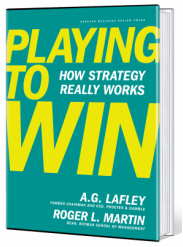 Roger L Martin, a respected professor at Rotman School of Management and co-author of Playing to Win, has put the cat amongst the pigeons, with this commentary, itself a response to this widely circulated article. The authors of the original article reported findings from a study, which showed that only eight per cent of leaders are good at both strategy and execution. Martin contends that most leaders who are very effective at either strategy formulation are also very effective at execution. Quite a different view. Two different perspectives. Who is correct? As with any report involving statistics, context is crucial. If you consider all leaders (as Leinwand, Mainardi and Kleiner did), only eight per cent are "very effective" at both formulating strategy and executing strategy. However, if you only consider only those that are "very effective at strategy", fully two-thirds are also good at execution (Martin's point). Thus, both authors are 'correct'. But which commentary is more helpful to leaders and those intent on achieving business success? The shocking statistic is that just sixteen per cent of leaders are "very effective" at strategy formulation or execution or both. Turbulent times demand outstanding leadership, both to determine strategy and to ensure it is executed with excellence. Poor, neutral and even "effective" contributions have little chance of moving companies toward their goals if they are competing against "very effective" leaders. Consequently, 84 per cent of leaders will be found wanting (notice the Pareto Principle?). Rather than debate statistics, it may be more useful to move the discussion to discovering how to move more leaders into the "very effective" sector. Another perhaps more important question—for boards of directors in particular—centres on Martin's assertion that strategy and execution are the same thing. Can the two tasks can be distinguished? Strategy formulation and execution are two of the four pillars of strategic management (development, approval, implementation and monitoring). My research suggests that business success is dependent on two things: having a clear sense of purpose and an effective strategy, and great execution. The former is an important task that boards and managers should work on together and the latter is the domain of management (only) once strategic decisions are made by the board. However, some flexibility is required because things change. Decisions and adjustments are required from time to time. If companies are to react and respond quickly, strong leadership is crucial to avoid mayhem. So where does that leave Martin's assertion, that formulation and execution cannot be usefully distinguished? What is your experience?
0 Comments
Leave a Reply. |
SearchMusingsThoughts on corporate governance, strategy and boardcraft; our place in the world; and other topics that catch my attention. Categories
All
Archives
May 2024
|
|
Dr. Peter Crow, CMInstD
|
© Copyright 2001-2024 | Terms of use & privacy
|

